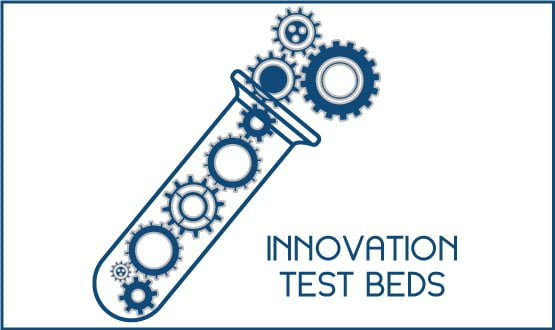Innovation test beds: doing IT at scale

No-one can could accuse Diabetes Digital Coach, one of the first wave of seven NHS test bed projects launched by NHS England in January, of lacking ambition.
The project is about to recruit 12,000 people with type 1 and type 2 diabetes to monitor and manage their condition using wearable technologies and smartphones.
Run by the West of England Academic Health and Science Network, Diabetes Digital Coach is a collaboration between 12 partners, including small technology companies such as Rescon and Oviva, the charity Diabetes UK and the health consultancy HEOR.
The aim, says Liz Dymond, deputy director of enterprise at the West of England AHSN, is to “keep people with diabetes in a better state of health for longer, so they don't get the complications that come with diabetes, or those complications happen later on.”
As well as using technology to monitor their condition, participants will use the Oviva app to receive an “intense period of individual coaching from a dietitian through the phone or tablet.”
Bringing many stakeholders together
First announced in the ‘Five Year Forward View’ – NHS England’s mega plan to improve prevention and change ways of working to save £30 billion by 2020-21 – the test beds are partnerships between NHS trusts, technology companies, charities and universities.
They will pilot combinations of technology that will, it is hoped, both improve patient care and save the NHS money. The test beds will, the report said, “serve as real world sites for ‘combinatorial’ innovations that integrate new technologies, bioinformatics, new staffing models and payment-for-outcomes.”
There have already been NHS trials of mobile technologies in patients’ homes, such as a recent pilot in Hounslow to enable patients with atrial fibrillation to monitor their condition with a mobile app. But until now, they have been small in scale and have usually involved only one technology.
With the test beds, NHS England is aiming at something altogether more ambitious: large trials that will test technologies in combination, generating data that will undergo rigorous academic evaluation.
Ramin Nilforooshan, lead clinician of the Surrey and Borders NHS Foundation Trust’s Technology Integrated Health Management test bed, which will support people with dementia, says that the projects are “about how technologies talk to each other, how we receive the data from technology and how we could implement technology in the workforce on a day-to-day basis.”
If successful, the hope is that they can be rolled out elsewhere in the NHS, enabling it to tackle, in a more systematic fashion, the cost burdens of an ageing population with long-term chronic conditions, which now consume up to 70% of the health service budget.
“If we could show that we could reduce hospital admissions by using these technologies, this would be a big winner,” Nilforooshan says. Such a move would also, NHS England believes, benefit patients, who will be able to to stay in their own homes for longer and manage and monitor their own illnesses.
Thinking big
Last year, technology companies from both the UK and abroad were given the opportunity to apply to take part in the trials, while NHS and social care organisations were invited to apply to become test bed sites.
The seven selected projects will run for two-to-three years; at the moment, most are still at the planning stage, with trial phases, typically lasting six-to-twelve months, expected to start later this year. An evaluation phase, in most cases carried out by academics at local universities, will follow.
The technologies used in the test beds all combine an element of self-monitoring in the patient’s home with remote, real-time data collection and analysis.
This can be used to alert clinicians to potential problems (such as a sudden spike in blood pressure) as well as provide a rich source of information about conditions such as diabetes, chronic obstructive pulmonary disease and dementia.
Collaboration between multiple partners will be an essential feature of the trials. (In the West of England testbed, for example, all seven local clinical commissioning groups, as well as local NHS trusts, will take part in testing the technologies.)
Two of the test beds (Diabetes Digital Coach and Technology Integrated Health Management) are funded by the government’s IoTUK programme, which aims to increase the adoption of Internet of Things technologies throughout businesses and the public sector.
The other five are:
Care City Health and Care, based in North East London, and aimed at helping elderly people live at home for longer
Long Term Conditions Early Intervention, which will analyse patterns in long-term conditions such as COPD in patients in Lancashire
Lancashire and Cumbria Innovation Alliance, designed to support elderly people with long-term conditions to live at home for longer
Perfect Patient Pathway, which will offer help to patients in Sheffield with a variety of long-term conditions, including diabetes, COPD and mental health problems
RAIDPlus Integrated Mental Health Urgent Care, which will offer more proactive support and intervention for people in Birmingham and Solihull with mental health problems.
Patients will be crucial
While trials on this scale face numerous challenges, including patient recruitment, clinician buy-in and keeping data secure, the ability to motivate patients will be key to success.
Glyn Jones, innovation programme manager for the Long Term Conditions Early Intervention Programme, for example, describes it as being “about patient activation, being part of your own healthcare.”
The programme will take 1,600 patients with chronic conditions such as COPD, atrial fibrillation or diabetes, and split them into four separate cohorts; three based on their level of risk of hospital admission, and the fourth consisting of dementia patients.
”By definition, the cohorts we are aiming for are effectively the reverse of tech-savvy,” says Jones. So the technology patients receive will be familiar and easy to use: the high-risk cohort will be given a Motiva hub attached to their television, enabling them to see their own data on screen. Data will be transmitted automatically to clinicians.
Similarly, dementia patients in the Surrey trial will measure their blood pressure simply by putting their hand in the blood pressure cuff. Nilforooshan says: “We don't want to make any sort of a burden on carers, because we know that if we make it complicated, it won't work for people with dementia.”
Big ambitions: many hurdles
Over the next few weeks, Digital Health will be running news stories about some of the test beds, looking at what they’re hoping to achieve and the challenges they face. These trials could transform the NHS’s approach to the management of long-term conditions – but expect some hurdles on the way.




